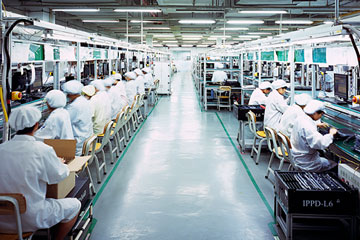
A Foxconn plant in Shenzhen, which puts together, among other products, the iPhone.
China is an unbeatable industrial juggernaut that will steamroll its competitors in its relentless quest for wealth and power. Right? Well, that's what most people think — and for good reason. In the mere 30 years since its communist leadership exchanged Maoist rhetoric for good old capitalism — or what it calls "socialism with Chinese characteristics" — China has become the world's second largest economy and the chief rival to the U.S. for global dominance. China's 1.3 billion upwardly mobile people are voracious consumers of everything from cars to smartphones to Kentucky Fried Chicken. Through its relentless exports, China has amassed a mountain of cash reserves and made itself Washington's biggest foreign creditor.
However, the China that vacuumed up factories to become the Workshop of the World is fading into history. The country is a victim of its own success. Decades of nonstop growth have forever altered China's place in the global economy and changed how it must compete with rich nations like the U.S. and emerging economies like India. The tools that China has used to spark its economic miracle — government support, cheap labor, state-directed finance — cannot ensure its future. The country can no longer rely on just making lots of stuff; China has to invent things, design them, brand them and market them. Instead of following the leaders of global industry, China has to produce leaders of its own.
Such a transition is not easy. Few emerging nations in modern times have made the leap from assembler to inventor, copycat to innovator. For China, this would mean an overhaul of its economy. Many of the products China manufactures today aren't really very Chinese at all. Apple iPads might be exported from assembly lines based in China, but the Chinese themselves do little more than piece them together. The core technologies come from elsewhere, and even the factories are run by foreign firms (like Taiwan's Foxconn). For Chinese companies to compete with the world's best, they have to create products of their own that have a similar impact as the iPad. That requires a set of skills and know-how they don't yet possess and a level of managerial expertise they haven't yet developed. Economist William Janeway, author of the book Doing Capitalism in the Innovation Economy, says what has gotten China thus far won't be enough for the next step: "It is hard to start the process of pushing the frontier with [such] practices and policies."
Chinese policymakers fully realize that. The new leadership team in Beijing, ushered into office a year ago, has pledged to press ahead with free-market reforms — liberalizing finance, supporting private enterprise and cracking open protected sectors. "China's modernization will not be accomplished without reform, nor will it be achieved without opening up," Premier Li Keqiang recently conceded. So far, though, progress has been slow. Few meaningful initiatives have been introduced, and even headline-grabbing measures — like the September launch of a special zone in Shanghai to experiment with freer capital flows — have proved mere baby steps. Li and his mandarins must take on vested interests and rein in an overbearing bureaucracy, which will require formidable political will. China's leadership "is not ready yet to deliver a comprehensive reform package with executable specifics and clear timetables," Bank of America Merrill Lynch economists warned in October.
Whether China succeeds or fails will determine where everything from sneakers to cars to smartphones are manufactured, the brands that appear on them and who sells them. Failure could stall China's economic miracle and dampen global growth with it. Here are five challenges China must address:
LABOR IS NO LONGER CHEAP.
In June, chip starnes made a fateful decision. The co-founder of Florida-based Specialty Medical Supplies, which makes alcohol pads, lancing devices and other health care products, decided to shift his plastics manufacturing from the company's Beijing factory to India. As he finalized severance packages for 34 workers he had to lay off, the remaining 110 employees revolted. First they demanded payouts of their own and blocked efforts to pack the equipment bound for India. Then, when a rumor spread that Starnes intended to close down the entire Beijing operation, the workers held the American hostage in his office for six days.
